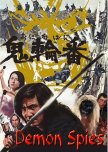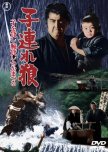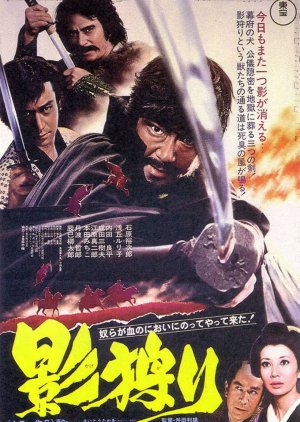
Shadow Hunters hunt ninja s!
Year 1972
Original title
Kagegari
Japanese title
???
Director
Toshio MASUDA
Cast
Mikio NARITA
Ruriko ASAOKA
Ryohei UCHIDA
Tetsuro TANBA
Yujiro ISHIHARA
Running time
89 minutes
Published
7 March 2007
Shadow HuntersShadow HuntersShadow Hunters
by Nicholas Rucka
An interesting quality of the chanbara film - or, perhaps, genre film in general - is its potential for social commentary, only barely veiled by the shroud of its genre trappings. In the case of exploitation films and program pictures, the filmmakers were often times political radicals (or people who held radical political opinions) who weren't afraid to vent their views. With many of these films, as long as the movies were delivered on time and budget, had the requisite number of deaths and nudie scenes and also made money - or, at least, didn't lose money - at the box office, then the directors were left alone. Toshio Masuda's Shadow Hunters can somehow be described as such a film, though it appears to be an unintended by-product of the times more than anything else.
Set during the declining years of the Tokugawa shogunate, Shadow Hunters details the questionably noble exploits of three ronin who act as "Shadow Hunters". These three ronin are not your normal ornery ruffians who are looking for a drink, a broad, and someone to jab a sword into, but are in fact former samurai who, rather than follow their destroyed fiefs and murdered masters into death via seppuku, have dedicated their combined sword prowess to stopping the government from raping its daimyos for valuable resources.
It turns out that in the Tokugawa era's twilight years, one of the tools that the shogunate would screw their daimyos with would be the ninja - sometimes referred to as 'shadows'. The 'shadows' would manipulate the daimyos by planting incriminating anti-shogunate evidence (therefore they could be taken over under the ruse of being treasonous or mutinous), by stealing valuable documents (asserting a fiefdom's inalienable right of existence), or by the assassination of key political figures and lords. In a sense, the Shadow Hunters act as a kind of firefighter to the Tokugawa shogunate's ninja bad guys; moving from land to land, offering their swords and ridding Japan of the accursed 'shadows' that destroyed their own clans.
When gold is found in a remote domain, the shogunate wants it! In fact, they NEED it since the Tokugawa desperately need any form of wealth to fuel their strict rule over the increasingly fractious Japanese archipelago. Enter the Shadow Hunters whose services are required to ensure the secure arrival to Edo of a writ, by none other than Ieyasu Tokugawa, which declared the inalienable rights of this daimyo's existence in perpetuity. Naturally the existence of this document is antithetical to the current corrupt shogunate's interest in this fiefdom, necessitating the use of ninjas to find and destroy said document. It is up to the three Shadow Hunters to stop the ninjas at any cost - preferably with great slashes to the ninja's backs liberating great geysers of pillar-box red blood from their clothing! Oh, and somewhere in this story there is also a weird subplot with lead Shadow Hunter Jubei's ex-fiancée who has been shadowing him across Japan because she wants the two of them to commit suicide together.
Outside of Japan, what makes Shadow Hunters and its sequel attractive is not particularly obvious from outside of a genre standpoint: movie star Yujiro Ishihara. The brother of current Tokyo governor and Japanese nationalist, Shintaro Ishihara, Yujiro was a giant of Japanese screen in the 1950s and 60s, who has been described rather curiously as 'a Japanese Elvis.' After several years of mammoth success and tiring of the same old thing it was clear that Ishihara was losing interest in the program pictures of his home studio Nikkatsu. When he handed in his notice in the late 60s to sow his seeds in greener pastures (occurring not long before Nikkatsu moved into the Roman Porno business), he formed his own production company Ishihara Productions, where both episodes of Shadow Hunters were made under the auspices of Masuda, a frequent collaborator from the Nikkatsu days.
At this point, while still maintaining a sizable fan following, years of wild living turned his once svelte action star frame into a corpulent capital 'D'. Rumor has it that he was losing interest in filmmaking in general and outside of a lame Hollywood outing and some middling films here and there he was increasingly focusing his interests on his enka singing career and sailing. This is evident in the trite and fairly bland performance he delivers as Jubei, the leader of the three Shadow Hunters. (And perhaps this antipathy goes some way to explain Ishihara's decision to wear the most absurd sideburns/beard ever put on an actor who wasn't playing a werewolf!) Fortunately Ishihara's Jubei is balanced out by a mustachioed Mikio Narita's puckish performance as the ever sex-hungry Sunbeam and the absurdly stoic and facially birthmarked Ryohei Uchida as the aptly named Moonbeam.
Essentially what we've got with this film is a decent but not terribly mind-blowing chanbara entry and one that recycles the well trodden, "there's gold up in them hills and the shogunate wants it, to hell with the little people" plotline. It has the requisite swordplay, ejaculations of blood, the occasional nudity and groaner oyaji humor, too. What else were you expecting from this film?
Oh, yeah, politics, right... Which is what I started with. Well, on that front, Shadow Hunters really is plain Jane in its criticism of the government - though by no means bereft. Not mining any new territory and choosing to reserve all judgment to the old "absolute power corrupts absolutely" and the "corrupt will fight to stay in power" school of thinking, the movie shelves any real sense of contemporary political criticism by means of a period genre film for something of a standard story. Which is too bad, because the film could've benefited from something sharper of a critique like, say, Lady Snowblood 2: Love Song of Vengeance does.
Year 1972
Original title
Kagegari
Japanese title
???
Director
Toshio MASUDA
Cast
Mikio NARITA
Ruriko ASAOKA
Ryohei UCHIDA
Tetsuro TANBA
Yujiro ISHIHARA
Running time
89 minutes
Published
7 March 2007
Shadow HuntersShadow HuntersShadow Hunters
by Nicholas Rucka
An interesting quality of the chanbara film - or, perhaps, genre film in general - is its potential for social commentary, only barely veiled by the shroud of its genre trappings. In the case of exploitation films and program pictures, the filmmakers were often times political radicals (or people who held radical political opinions) who weren't afraid to vent their views. With many of these films, as long as the movies were delivered on time and budget, had the requisite number of deaths and nudie scenes and also made money - or, at least, didn't lose money - at the box office, then the directors were left alone. Toshio Masuda's Shadow Hunters can somehow be described as such a film, though it appears to be an unintended by-product of the times more than anything else.
Set during the declining years of the Tokugawa shogunate, Shadow Hunters details the questionably noble exploits of three ronin who act as "Shadow Hunters". These three ronin are not your normal ornery ruffians who are looking for a drink, a broad, and someone to jab a sword into, but are in fact former samurai who, rather than follow their destroyed fiefs and murdered masters into death via seppuku, have dedicated their combined sword prowess to stopping the government from raping its daimyos for valuable resources.
It turns out that in the Tokugawa era's twilight years, one of the tools that the shogunate would screw their daimyos with would be the ninja - sometimes referred to as 'shadows'. The 'shadows' would manipulate the daimyos by planting incriminating anti-shogunate evidence (therefore they could be taken over under the ruse of being treasonous or mutinous), by stealing valuable documents (asserting a fiefdom's inalienable right of existence), or by the assassination of key political figures and lords. In a sense, the Shadow Hunters act as a kind of firefighter to the Tokugawa shogunate's ninja bad guys; moving from land to land, offering their swords and ridding Japan of the accursed 'shadows' that destroyed their own clans.
When gold is found in a remote domain, the shogunate wants it! In fact, they NEED it since the Tokugawa desperately need any form of wealth to fuel their strict rule over the increasingly fractious Japanese archipelago. Enter the Shadow Hunters whose services are required to ensure the secure arrival to Edo of a writ, by none other than Ieyasu Tokugawa, which declared the inalienable rights of this daimyo's existence in perpetuity. Naturally the existence of this document is antithetical to the current corrupt shogunate's interest in this fiefdom, necessitating the use of ninjas to find and destroy said document. It is up to the three Shadow Hunters to stop the ninjas at any cost - preferably with great slashes to the ninja's backs liberating great geysers of pillar-box red blood from their clothing! Oh, and somewhere in this story there is also a weird subplot with lead Shadow Hunter Jubei's ex-fiancée who has been shadowing him across Japan because she wants the two of them to commit suicide together.
Outside of Japan, what makes Shadow Hunters and its sequel attractive is not particularly obvious from outside of a genre standpoint: movie star Yujiro Ishihara. The brother of current Tokyo governor and Japanese nationalist, Shintaro Ishihara, Yujiro was a giant of Japanese screen in the 1950s and 60s, who has been described rather curiously as 'a Japanese Elvis.' After several years of mammoth success and tiring of the same old thing it was clear that Ishihara was losing interest in the program pictures of his home studio Nikkatsu. When he handed in his notice in the late 60s to sow his seeds in greener pastures (occurring not long before Nikkatsu moved into the Roman Porno business), he formed his own production company Ishihara Productions, where both episodes of Shadow Hunters were made under the auspices of Masuda, a frequent collaborator from the Nikkatsu days.
At this point, while still maintaining a sizable fan following, years of wild living turned his once svelte action star frame into a corpulent capital 'D'. Rumor has it that he was losing interest in filmmaking in general and outside of a lame Hollywood outing and some middling films here and there he was increasingly focusing his interests on his enka singing career and sailing. This is evident in the trite and fairly bland performance he delivers as Jubei, the leader of the three Shadow Hunters. (And perhaps this antipathy goes some way to explain Ishihara's decision to wear the most absurd sideburns/beard ever put on an actor who wasn't playing a werewolf!) Fortunately Ishihara's Jubei is balanced out by a mustachioed Mikio Narita's puckish performance as the ever sex-hungry Sunbeam and the absurdly stoic and facially birthmarked Ryohei Uchida as the aptly named Moonbeam.
Essentially what we've got with this film is a decent but not terribly mind-blowing chanbara entry and one that recycles the well trodden, "there's gold up in them hills and the shogunate wants it, to hell with the little people" plotline. It has the requisite swordplay, ejaculations of blood, the occasional nudity and groaner oyaji humor, too. What else were you expecting from this film?
Oh, yeah, politics, right... Which is what I started with. Well, on that front, Shadow Hunters really is plain Jane in its criticism of the government - though by no means bereft. Not mining any new territory and choosing to reserve all judgment to the old "absolute power corrupts absolutely" and the "corrupt will fight to stay in power" school of thinking, the movie shelves any real sense of contemporary political criticism by means of a period genre film for something of a standard story. Which is too bad, because the film could've benefited from something sharper of a critique like, say, Lady Snowblood 2: Love Song of Vengeance does.

Year
1972
Original title
Kagegari
Japanese title
???
Director
Toshio MASUDA
Cast
Mikio NARITA
Ruriko ASAOKA
Ryohei UCHIDA
Tetsuro TANBA
Yujiro ISHIHARA
Running time
89 minutes
Published
7 March 2007
Shadow HuntersShadow HuntersShadow Hunters
by Nicholas Rucka
An interesting quality of the chanbara film - or, perhaps, genre film in general - is its potential for social commentary, only barely veiled by the shroud of its genre trappings. In the case of exploitation films and program pictures, the filmmakers were often times political radicals (or people who held radical political opinions) who weren't afraid to vent their views. With many of these films, as long as the movies were delivered on time and budget, had the requisite number of deaths and nudie scenes and also made money - or, at least, didn't lose money - at the box office, then the directors were left alone. Toshio Masuda's Shadow Hunters can somehow be described as such a film, though it appears to be an unintended by-product of the times more than anything else.
Set during the declining years of the Tokugawa shogunate, Shadow Hunters details the questionably noble exploits of three ronin who act as "Shadow Hunters". These three ronin are not your normal ornery ruffians who are looking for a drink, a broad, and someone to jab a sword into, but are in fact former samurai who, rather than follow their destroyed fiefs and murdered masters into death via seppuku, have dedicated their combined sword prowess to stopping the government from raping its daimyos for valuable resources.
It turns out that in the Tokugawa era's twilight years, one of the tools that the shogunate would screw their daimyos with would be the ninja - sometimes referred to as 'shadows'. The 'shadows' would manipulate the daimyos by planting incriminating anti-shogunate evidence (therefore they could be taken over under the ruse of being treasonous or mutinous), by stealing valuable documents (asserting a fiefdom's inalienable right of existence), or by the assassination of key political figures and lords. In a sense, the Shadow Hunters act as a kind of firefighter to the Tokugawa shogunate's ninja bad guys; moving from land to land, offering their swords and ridding Japan of the accursed 'shadows' that destroyed their own clans.
When gold is found in a remote domain, the shogunate wants it! In fact, they NEED it since the Tokugawa desperately need any form of wealth to fuel their strict rule over the increasingly fractious Japanese archipelago. Enter the Shadow Hunters whose services are required to ensure the secure arrival to Edo of a writ, by none other than Ieyasu Tokugawa, which declared the inalienable rights of this daimyo's existence in perpetuity. Naturally the existence of this document is antithetical to the current corrupt shogunate's interest in this fiefdom, necessitating the use of ninjas to find and destroy said document. It is up to the three Shadow Hunters to stop the ninjas at any cost - preferably with great slashes to the ninja's backs liberating great geysers of pillar-box red blood from their clothing! Oh, and somewhere in this story there is also a weird subplot with lead Shadow Hunter Jubei's ex-fiancée who has been shadowing him across Japan because she wants the two of them to commit suicide together.
Outside of Japan, what makes Shadow Hunters and its sequel attractive is not particularly obvious from outside of a genre standpoint: movie star Yujiro Ishihara. The brother of current Tokyo governor and Japanese nationalist, Shintaro Ishihara, Yujiro was a giant of Japanese screen in the 1950s and 60s, who has been described rather curiously as 'a Japanese Elvis.' After several years of mammoth success and tiring of the same old thing it was clear that Ishihara was losing interest in the program pictures of his home studio Nikkatsu. When he handed in his notice in the late 60s to sow his seeds in greener pastures (occurring not long before Nikkatsu moved into the Roman Porno business), he formed his own production company Ishihara Productions, where both episodes of Shadow Hunters were made under the auspices of Masuda, a frequent collaborator from the Nikkatsu days.
At this point, while still maintaining a sizable fan following, years of wild living turned his once svelte action star frame into a corpulent capital 'D'. Rumor has it that he was losing interest in filmmaking in general and outside of a lame Hollywood outing and some middling films here and there he was increasingly focusing his interests on his enka singing career and sailing. This is evident in the trite and fairly bland performance he delivers as Jubei, the leader of the three Shadow Hunters. (And perhaps this antipathy goes some way to explain Ishihara's decision to wear the most absurd sideburns/beard ever put on an actor who wasn't playing a werewolf!) Fortunately Ishihara's Jubei is balanced out by a mustachioed Mikio Narita's puckish performance as the ever sex-hungry Sunbeam and the absurdly stoic and facially birthmarked Ryohei Uchida as the aptly named Moonbeam.
Essentially what we've got with this film is a decent but not terribly mind-blowing chanbara entry and one that recycles the well trodden, "there's gold up in them hills and the shogunate wants it, to hell with the little people" plotline. It has the requisite swordplay, ejaculations of blood, the occasional nudity and groaner oyaji humor, too. What else were you expecting from this film?
Oh, yeah, politics, right... Which is what I started with. Well, on that front, Shadow Hunters really is plain Jane in its criticism of the government - though by no means bereft. Not mining any new territory and choosing to reserve all judgment to the old "absolute power corrupts absolutely" and the "corrupt will fight to stay in power" school of thinking, the movie shelves any real sense of contemporary political criticism by means of a period genre film for something of a standard story. Which is too bad, because the film could've benefited from something sharper of a critique like, say, Lady Snowblood 2: Love Song of Vengeance does.

Samurai vs. Ninjas!
Cast
Cast overview, first billed only:
Tomisaburô Wakayama Tomisaburô Wakayama ... Ogami Itto
Fumio Watanabe Fumio Watanabe ... Bizennokami Yagyû
Gô Katô Gô Katô ... Ikiyu
Tomoko Mayama Tomoko Mayama ... Osen (whore)
Yûko Hama Yûko Hama
Shigeru Tsuyuguchi Shigeru Tsuyuguchi ... Kurando Yagyû
Asao Uchida Asao Uchida ... Kenmotsu Sugito
Taketoshi Naitô Taketoshi Naitô ... Ichige
Yoshi Katô Yoshi Katô ... Danjô Tonami
Keiko Fujita Keiko Fujita ... Azami Ogami
Isao Yamagata Isao Yamagata
Reiko Kasahara Reiko Kasahara ... Crazy Woman
Ichirô Nakae Ichirô Nakae
Michitarô Mizushima Michitarô Mizushima
Akihiro Tomikawa Akihiro Tomikawa ... Daigoro
See full cast »
View production, box office, & company info
Edit
Storyline
In this first film of the Lone Wolf and Cub series, adapted from the manga by Kazuo Koike, we are told the story of the Lone Wolf and Cub's origin. Ogami Itto, the official Shogunate executioner, has been framed for disloyalty to the Shogunate by the Yagyu clan, against whom he now is waging a one-man war, along with his infant son, Daigoro. Written
Cast
Cast overview, first billed only:
Tomisaburô Wakayama Tomisaburô Wakayama ... Ogami Itto
Fumio Watanabe Fumio Watanabe ... Bizennokami Yagyû
Gô Katô Gô Katô ... Ikiyu
Tomoko Mayama Tomoko Mayama ... Osen (whore)
Yûko Hama Yûko Hama
Shigeru Tsuyuguchi Shigeru Tsuyuguchi ... Kurando Yagyû
Asao Uchida Asao Uchida ... Kenmotsu Sugito
Taketoshi Naitô Taketoshi Naitô ... Ichige
Yoshi Katô Yoshi Katô ... Danjô Tonami
Keiko Fujita Keiko Fujita ... Azami Ogami
Isao Yamagata Isao Yamagata
Reiko Kasahara Reiko Kasahara ... Crazy Woman
Ichirô Nakae Ichirô Nakae
Michitarô Mizushima Michitarô Mizushima
Akihiro Tomikawa Akihiro Tomikawa ... Daigoro
See full cast »
View production, box office, & company info
Edit
Storyline
In this first film of the Lone Wolf and Cub series, adapted from the manga by Kazuo Koike, we are told the story of the Lone Wolf and Cub's origin. Ogami Itto, the official Shogunate executioner, has been framed for disloyalty to the Shogunate by the Yagyu clan, against whom he now is waging a one-man war, along with his infant son, Daigoro. Written








